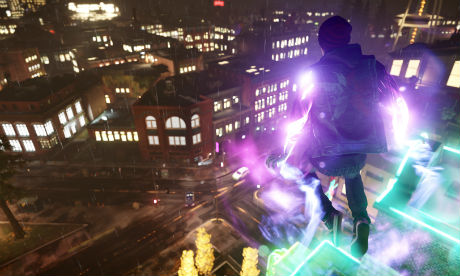
Sony; PlayStation 4; 16+; £50
As the first open-world exclusive on PlayStation 4, coming just a week after Xbox One's killer app Titanfall, there is plenty of interest in Second Son. The latest title in Sucker Punch's angsty super hero series certainly has the glossy sheen and astonishing effects of an early system seller. But the immediate question is whether there is much of substance beyond the flashy polygons.
The first problem is the world itself. Moving from the fictional cities of past games to a colourfully stylised (if relatively condensed) interpretation of Seattle, Second Son offers an inviting environment but never turns it into an interesting place to be or explore. Many areas are nondescript with only a couple of recognisable landmarks creating the sense that you're exploring somewhere real and interesting. Pedestrians bustling around, traffic runs on cycled loops, the city tries to fool you – but it fails. You instantly know that it's just a playground – not a world. Sure, it looks genuinely breathtaking, with a range of different weather effects, but the lack of a real dynamic day-night cycle furthers the feeling that you're playing a demo, or a single level, rather than investing yourself in a place.
And then there is lead man Delsin Rowe, who wakes one morning with super powers after an encounter with a bio-terrorist group known as the conduit. Intended as a charming counter-culture rogue, his attitude initially comes off as forced and insincere, and the prospect of spending 10 more hours with this dudebro isn't an attractive one. Things improve however, and gradually he eclipses original InFamous stalwart Cole McGrath, growing in to the teen angst tone of the game perfectly. His comical quips and likeability hold the game intact, bringing the cast of surrounding characters together whichever moral path you decide to run down.
It's a shame, then, that your companions feel either underused or hollow. Delsin's cop brother Reggie is a walking buzz kill, pushing Delsin to relinquish his powers. Their relationships developers but it never convinces. More interesting personalities like drug dealer-hunting rebel-girl Fetch, provide some of the game's few binary moral choices, but everyone ends up being sidelined. Perhaps the most intriguing character in the game is the aptly hard-ass rock-queen, Augustine. Your quest to find her is the driving force of Second Son's main story, and while your encounters together are frequently frustrating her payoff is an interesting one that adds depth to her characterisation.
Super heroics
Second Son ramps up the comic book action further than previous games. There's a giant flying angel made out of video torrents, concrete men with the power to shoot rock pillars, and you can buzz around the city like a streak of fluorescent photons. The game splits powers up, too, so you can only wield one element at a time. To change, you have to visit a power source and then acquire each different set of abilities.
While this avoids overpowering the character, it stifles the series' excellent combat mechanics. Taking down multiple enemies with smoke missiles and neon bolts is extremely satisfying as Delsin darts across the landscape, switching between ranged and melee attacks, but having to switch powers on the fly becomes a chore if you're in an extended firefight. Power sources like smoking cars and neon signs are finite resources, and with the game's surprising level of challenge, you can often find yourself having to constantly move between the scene of the firefight and the nearest power sources, which can often be a fair stretch from the action. It makes it even more frustrating that navigating the game's vertical landscapes is clunky, imprecise and joyless until the later portions of the game when you've upgraded your powers enough to have near-permanent flying capabilities.
Sadly, it takes a long time before you really feel like you're a superhero. Even on normal and easy difficulties, Second Son throws in some infuriating set-pieces during which enjoyment frequently gives way to frustration. Having to charge up powers, switch between them depending on circumstance and keep moving at all times gives the game an overly defensive feel. You are usually on the run, rather than on the offensive. This is most prevalent in the boss battles, which go on for far, far too long.
Moral battle
There's an attempt to deepen the experience through the continuation of the series' good vs evil morality system. With the jump to next-gen, we were expecting some breadth to bulk out the relatively simple binary dilemmas of previous instalments, but the game never delivers. Choices play out the same each time; you simply pull a trigger for whichever avenue you want to explore. Hardcore fans will probably want to experience both sides of the story, and particular power upgrades are specific only to a certain moral compass, but none of this actually make you think on a moral level.
In the end, InFamous Second Son comes off as gorgeous, carefree fun, but a disappointing next-gen entry. The combat is as fast-paced and open to experimentation as it's ever been, but there is never the same sense of real power that the previous games delivered. Sucker Punch clearly wanted to create a big-hearted hero in Delsin, but there's a surprising lack of soul in everything else.

